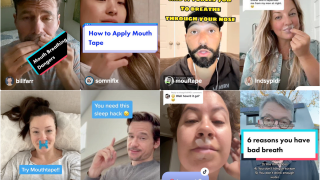
#Mouthtape for sleep is trending on TikTok with 38.5 million views, accompanied by videos of people with tape over their mouths as they prepare to go to bed.
Many posters claim this increases their ability to breathe through their nose throughout the night, reduces snoring, lowers their risk of cavities, and even gives them better breath in the morning. Some argue that breathing through your mouth while sleeping "puts you at higher risk for sleep disorders like snoring, sleep apnea & hypopnea."
Lauryn Bosstick, a blogger and podcaster, says she tapes her mouth shut every night. "Honestly, you guys, what I've noticed the most is I just have a deeper sleep which gives me so much more energy in the morning," Bosstick said in her TikTok video.
Feeling out of the loop? We'll catch you up on the Chicago news you need to know. Sign up for the weekly Chicago Catch-Up newsletter here.
Does taping your mouth help you sleep better? 'There's not a lot of evidence'
Taping your mouth shut is not likely to help you sleep: "The answer is probably not," says David Schulman, professor of medicine at Emory School of Medicine and president of the American College of Chest Physicians.
A common reason why people are mouth taping is to decrease snoring. That may be possible, but "there's not a lot of evidence that it actually helps your sleep apnea, or your health," he adds.
Meanwhile, taping your mouth while you sleep may not be fully safe. Here are some possible outcomes of having your mouth taped at night, he says:
- Difficulty breathing if you have nasal congestion
- Worsening your breathing as you sleep
- Allergies
- Lip irritation from the tape
- Dry lips
"I do not advocate that patients tape their mouth for sleep," Schulman says. "And certainly, if they snore and might have sleep apnea, that can get worse. So that's particularly a dangerous thing to do."
Money Report
Before trying taping, it's important to ensure that you don't have an anatomical obstruction in your nose like a deviated septum, says Raj Dasgupta, spokesperson for the American Academy of Sleep Medicine who practices medicine in the division of pulmonary, critical care and sleep medicine.
"Let's say they have a blockage in their nose. Could you imagine taping your mouth and your nose is blocked?" he asks. "I definitely would be careful when we talk about mouth taping."
Benefits of nose breathing while sleeping and safer ways to do it
Some people consider mouth taping to induce nose breathing throughout the night. Breathing through your nose while sleeping is good for overall health because it humidifies and filters the air better than mouth breathing, Dasgupta says. This makes the air you breathe in less irritating to the lungs, he adds.
Additionally, "when you wake up in the morning, you won't have that dry mouth or bad breath," he adds.
Nose breathing while resting could increase nitride oxide, a compound in your body that can be helpful for keeping your blood pressure under control, Dasgupta notes.
"I don't feel that taping your mouth is the only option," he says. These are some other things you can do to avoid mouth breathing and snoring:
- See a doctor to check if you have obstructive sleep apnea
- Don't sleep on your back
- Consider what and when you eat
- Don't drink alcohol right before bed
- Exercise more often
10 sleeping tips to consider before mouth taping
If you're having a hard time getting the sleep you desire at night, consider these options that Dasgupta and Schulman suggest:
- Avoid eating or drinking two to three hours before bed (if you've drunk enough water)
- Walk often throughout the day and get some sunlight
- Take a warm shower or bath as you're winding down for bed
- Try the 4-7-8 breathing technique: inhale for four seconds, hold for seven seconds, and exhale for eight seconds. Repeat as many times as you like before resting
- Don't drink alcohol three to four hours before sleeping
- Aim to leave a two-hour gap between eating carbs and heading to bed
- Empty your bladder before attempting to sleep
- Get your room's temperature to about 68 to 70 degrees
- Turn off screens or shift phone to night mode at least an hour before bed
- Use white noise as background noise instead of TV shows or movies that may distract you
All of the recommendations will have distinct effects on sleep for different people, and the best practices for each person will differ, says Schulman.
"For people who are maybe not doing these best practices but aren't having any problems, sometimes that's okay," he says.
Sign up now: Get smarter about your money and career with our weekly newsletter
Don't miss:






